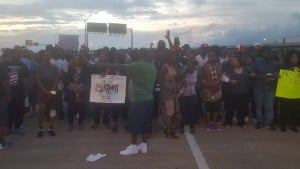Editors’ Note: This article is part of the Patheos Public Square on the Future of Progressive Christianity in America. Read other perspectives beginning this evening here.
In May of 2015, the Pew Research Center on Religion and Public Life surprised both conservatives and progressives with its findings in their “America’s Changing Landscape” report. In it, many discovered that “the Christian share of the U.S. population is declining, while the number of U.S. adults who do not identify with any organized religion is growing.” While many expected the drop in religious affiliation to occur with young adults, after all, we had been constantly reading about the “rise of the nones,” the surprise came when we discovered that the decline occurred “among Americans of all ages.” The report suggested that the trend was total; “whites, blacks and Latinos; among both college graduates and adults with only a high school education; and among women as well as men.”
While the Pew Study offered two primary factors behind the changing landscape of religious affiliation–mainly “generational replacement” (millennials as they get older, they display much lower levels of religious affiliation) and older generations disavowing association with organized religion, they did not offer any reason as to why millennials and older generations leave the faith. While there are several reasons for leaving the faith, one reason could be how the media and society frame manifestations of the faith.
Until recently, due to media framing, to be a Christian meant one had to be a fundamentalist or a conservative. When the media wanted a “Christian representative” to speak on an issue, they usually would get someone who brought a conservative political ideology masking as the language of the faith. As more and more pundits, politicians, preachers and prophets promoted and proclaimed this type of Christianity, many began to believe that being Christian meant that one had to be overly judgmental, hypocritical, unloving, and have a faith that was out of touch with reality. Moreover, by framing the faith conservatively, many believed that Christianity was the sole property of conservatives and every time one of those firebrand prophets reign down anathemas blaming societal ills on black and brown people, women, gays, poor people, “illegals,” or the lazy, folks left the faith in droves.
However, on the ground, in churches and community centers, in living rooms and dorm rooms, in suites and the streets and anywhere in between, people were producing a counter narrative to the hegemonic faith masquerading as authentic Christianity. This faith was inclusive; it said that all are the beloved of God and anyone coming had a place at the table. This faith was open to questions and was not afraid to critique long held traditions and beliefs. This faith, contrary to some critiques of it, took seriously the Bible and the teachings of Jesus. This faith engaged culture and instead of bringing God to a place, this faith listened and discern where God was already at work and joined in looking for ways to serve.
This faith stood in the streets of Ferguson, Baltimore, New York, Cleveland and now Memphis demanding justice. This faith spoke truth to power; risking arrest and even death when standing up for justice. This faith formed relationships with those proverbially on the margins of society and demonstrated the love of Christ. This faith helped people understand that they too were created in the image of God, they too are loved of God, and that they too have meaning and purpose in their lives. This faith kept doing the work on the ground and answering the call to radically hospitality.
Therefore, when the Pew Research Report came out, we, the ones practicing this type of faith, were not worried. We first see this as an opportunity to expand our understanding of how we do and be church. If this report told us anything, it told us that the way we do church need to change. Moreover, the report also told us that our conceptions of what church is might need expanding as well.
For example, Katherine Whitfield sees members of the #BlackLivesMatter Movement as her church. She writes about BLM:
They are the Ekklesia – a spiritual personhood bound together in love, free flowing, informal, and assembled for the purpose of proclaiming and acting out one simple, undeniable element of Gospel truth. They proclaim that the lives of black men, women, and children matter, and that the age of shalom will never truly come until this truth is acknowledged and reflected in the deepest threads of our nation’s social fabric.
She argues that the “ekklesia is happening all around us, and church is taking place far beyond the walls of the formal building with the steeple.” Whitfield writes that she has found her “authentic, beloved community of worshippers” and for her, they are the “ekklesia – and they have a story to tell, to any who will listen and believe.”
What progressive Christianity must continue to do is to offer these and other expressions of church for people who do not see the traditionally trappings of the church as being useful for them. Furthermore, we must continue not only to proclaim the good news but in many instances, being living manifestations of that same good news.











